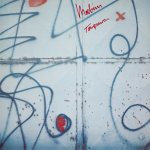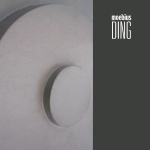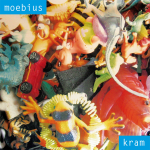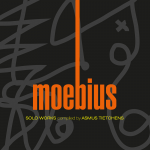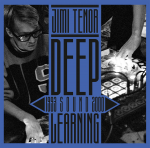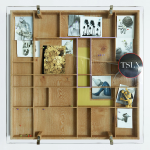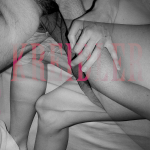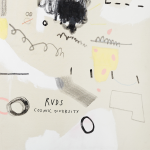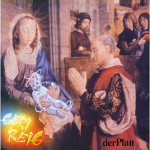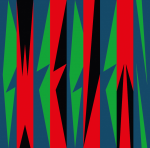ProductDetails
- 01. Contramio
02. Hasenheide
03. Rattenwiesel
04. Transport
05. Etwas
06. Nervös
07. B 36
08. Furbo
09. Sinister
10. ImmerhinMOEBIUS
Tonspuren (40th anniversary edition)
[engl] By 1969 at the latest, Dieter Moebius was synonymous with the avant-garde electronic music scene in Germany. He and Hans-Joachim Roedelius formed Cluster, a seminal electronic/ambient duo, whilst Moebius was also a member of the so-called Krautrock supergroup Harmonia (with Michael Rother and Roedelius), as well as collaborating on various other projects with the likes of Brian Eno and Mani Neumeier from Guru Guru. Somehow, it took Moebius until 1983 to release his own solo debut album, Tonspuren. Tonspuren is an album of minimalisms, miniatures and stringent form, ten consistently concise and precise pieces. Moebius develops tonal variations out of minimalistic, rhythmic, harmonic basic tracks, sometimes coming close to tangible melodies. Yet this is exactly the point at which he purposely steers clear of electronic pop criteria. Nevertheless, Tonspuren is a pop album, its radically stripped down contents replenished with harmonious elements of prevalent popular music. Echoes of Cluster notwithstanding, the music of Tonspuren is a separate entity altogether. Moebius seems to be avoiding improvisation as the devil keeps his distance from holy water. Each piece is thoughtfully composed, as Moebius crafts his miniatures layer by layer. Spontaneous inaccuracies have no place here, noise escapades are nipped in the bud. Baroque, folklore and frivolity are not admitted into the studio when the red light is on. Thanks to Tonspuren, the keen listener now has the opportunity of direct comparison in his appraisal of the solo albums of Dieter Moebius, Hans Joachim Roedelius and Michael Rother. What role did each of the Harmonia triumvirate play in creating the style of the supergroup? Tonspuren thus represents a vital piece of the Harmonia puzzle.- Format
- LP
- Release-Datum
- 08.12.2023
- EAN
- EAN 4015698263534
Mehr von »MOEBIUS«
MOEBIUS
Ding
[engl] Dieter Moebius—one half of the legendary duo Cluster and the godfather of electronic krautrock—passed away in the summer of 2015. Bureau B are reissuing his final four solo albums. Following on frMOEBIUS
Kram
[engl] Dieter Moebius—one half of the legendary duo Cluster and the godfather of electronic krautrock—passed away in the summer of 2015. Bureau B are reissuing his final four solo albums. Following on frMOEBIUS
Solo Works. Kollektion 7. Compiled by Asmus Tietchens.
[engl] Dieter Moebius is one of the most important protagonists of avant-garde electronic music in Germany. Alongside his bands Kluster/Cluster and Harmonia, he participated in numerous collaborations (with
Mehr vom Label »Bureau B«
JIMI TENOR
Deep Sound Learning (1993 - 2000)
[engl] Jimi Tenor can look back on a career spanning almost 30 years, in which time he has released more than 20 albums on such renowned labels as Warp Records, Sähkö and Kitty-Yo. Pop artist prestige holdTOLOUSE LOW TRAX
Leave Me Alone
[engl] With "Leave Me Alone", Detlef Weinrich presents his fifth album under the moniker Tolouse Low Trax. Weinrich, who has meanwhile turned his back on Düsseldorf and lives in Paris, has long since ceasedKREIDLER
Twists (A Visitor Arrives)
[engl] Kreidler's seventh long-playing record for Bureau B is an affair of electronic pop music nurtured in now- clubs and rooted in Rhenish kraut, British post-punk (with a touch of NYC and Brussels) anRICHARD VON DER SCHULENBURG
Cosmiv Diversity
Der Hamburger Synthesist Richard von der Schulenburg kehrt mit dem Nachfolger von „Moods & Dances 2021“ aus dem letzten Jahr zu Bureau B zurück. Mit Hardware-Crunch, kryptischen KlangfundstückenDER PLAN
Geri Reig
[engl] Der Plan (Moritz R®, Frank Fenstermacher, Pyrolator) are seen as key pioneers of the German New Wave (Neue Deutsche Welle). They revolutionized synthesizer pop on their debut album "Geri Reig" (1980)CEL (Felix Kubin & Hubert Zemler)
Gegenwelt
[engl] Gegenwelt (Parallel World) is the second LP by CEL, a duo Kubin and Zemler formed. More melodically- evolved than their eponymous 2020 debut, it is an even more explicit example of the syncretic impul

